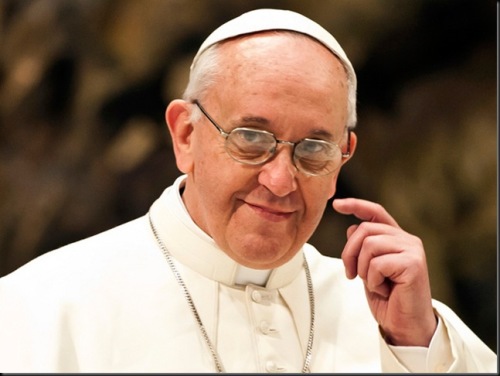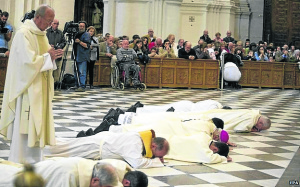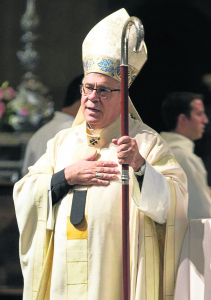Is Spain’s Catholic Church on Its Knees?
By Jacqueline Fanchini and Tom Powell
“THE truth is the truth, and we must not hide it,” the Pope ruled, just days before a judge in Granada filed preliminary charges against three priests and a religious teacher for the sexual abuse of a former altar boy. With up to a dozen more under investigation – and new victims coming out by the week – it has been dubbed the ‘gravest sexual abuse scandal’ in the history of the Catholic church in Spain. The gravity of the situation certainly became apparent, with Pope Francis himself feeling the need to step into the scandal, after a victim contacted him personally. Since the court launched its investigation a fortnight ago, at least one more victim has gone public with a similar litany of abuses. There are believed to be many more victims. Either way, the scandal has now led to the most extraordinarily unprecedented display of humility from religious men, who normally like to pontificate from on high. In a bizarre picture opportunity, the Archbishop of Granada and other clerics prostrated themselves at the city’s cathedral during Mass, ‘asking forgiveness for the sins of the Church, for all of the scandals that have, or might have, occurred among us’. The solemn scene raised yet more damning questions for an institution facing allegations that constitute an appalling perversion of power. Catholicism and its age-old traditions are as much ingrained in the fabric of Spain as flamenco and bullfighting. The most famous Catholic pilgrimage in the world leads to its doorstep, at the venerated door of the Cathedral of Santiago de Compostela, in Galicia. Other famous pilgrimages go to Covadonga in Asturias and El Rocio in Huelva. But just as Spain’s corridors of political power have been besmirched by corruption, its ecumenical institutions are being stained by scandals that may never be wiped clean. And while Spain’s religious leaders stand firm in the face of accusations that have rocked the world, it will be hard for the Church to fully regain its respect.
The facts are that the Spanish are already losing their faith. The national average attendance of Mass in 2010 was 14.4% but many priests have hinted that the figure is now much lower. And is it any wonder with the suspicion that priests up and down the country may be involved in paedophilia. The current ‘altar boy case’ has thrown Spain into the centre of a global debate on the Church’s internal handling of abuse allegations. This specific probe was launched after Pope Francis personally received a letter from a young man claiming to have been abused by a ring of priests in Granada from the age of 13 onwards. The group allegedly drew boys into their sphere of influence by taking them on as altar boys or ‘assistants’ before molesting them. The alleged victim had tried to confide in Granada’s own Catholic investigation section but was repeatedly ignored. However, in a personal telephone call to the man, now a 24-year-old teacher, Pope Francis encouraged him to go to the Guardia Civil and denounce his abusers, to ensure a full investigation would take place. The Pope commented that the news had caused him ‘great pain’. Since the turn of the millenium, Spain’s Catholic Church – where priests are not allowed to have wives and demands celibacy – has lurched from one embarrassing crisis to the next. When Pope Francis announced his zero-tolerance policy towards abuse in May, hopes were raised that a corner had been turned. “I commit myself not to tolerate harm done to a minor by any individual, whether a cleric or not,” he announced to the world. But Pope Francis himself has been accused of covering up sex abuse scandals in the past, while he was a cardinal in Argentina. And with each new skeleton that emerges from the closet, trust in the church diminishes. In December 2007, a bishop in Tenerife provoked widespread anger over his disturbing comments about children in the Church who ‘want to be abused’. Bishop Bernardo Alvarez said: “There are 13-year-olds who are under age and who are perfectly in agreement with it and wanting it, and if you are careless they will even provoke you.” Three years later, Cordoba’s Catholic order was publicly embroiled in a sexual abuse scandal, when a priest, Brother Manolo, respected for his charity work, was ordered to stay away from the Francis of Assisi Centre he once ran, and from its residents. But clerical sexual abuse has not been confined to young boys working within church portals. In June this year, a Moroccan maid accused a priest in Madrid of exploiting her for four years. He allegedly abused her sexually and subjected her to psychological and physical torture. Four years ago, another priest was found to have 21,000 indecent images of children on a computer at his church in Castellon. There are many more examples. As the murky underbelly of child sex abuse is exposed on a global scale, people are beginning to stereotype so-called celibate priests as paedophiles. Moreover, clerical sex abuse victims estimate that the reported cases barely scratch the surface of a pandemic within Spain. It is not hard to see why the global attitude towards the clergy has changed from one of respect to ridicule. Despite the Pope estimating that only 2% of clerics could be paedophiles, Catholic priests have sadly become synonymous with child abuse. There is even a video game called Vatican Quest which portrays the previous Pope, Benedict XVI, as a pimp for paedophile cardinals. But arguably the biggest church scandal of all did take place in Spain. From 1939 until the 1990s, an incredible 300,000 babies were stolen from their parents at birth and sold through the Catholic adoption network to childless couples with money and the right connections. As the Olive Press has reported on many occasions, mothers were told that their babies had died at birth, sometimes even being shown a frozen corpse. In fact, 15% of the adoptions in Spain between 1960 and 1989 are believed to have been ‘stolen babies’, figures that beggar belief. More than 2,000 cases have been filed through the Spanish courts, while many victims continue to search for the mother they never met; or, in other cases, the child they thought had died at birth. Nonetheless, the Catholic Church has continued to play an integral part in Spanish life, typified by the solemn Semana Santa celebrations which see huge numbers of worshippers spilling into the streets to watch the processional thrones. It is impossible to envisage 2 million people lining the streets of Birmingham at night to watch a brotherhood carry a candlelit float of the Virgin Mary to the cathedral. But they do it in Sevilla and Malaga… and even in staunch Communist/Socialist-run towns like Cordoba, Arriate and Casares. The institutionalisation of Catholicism in government, the law and society as a whole, is undoubtedly part of the problem.In schools, Catholic education is compulsory, while most children still take communion in Andalucia. When one expat’s child ‘opted out’ of religious education in her school in a communist run village near Ronda, last year, she ended up sitting on the floor of the headmaster’s office, reading a book.
Victims have had nowhere to turn in a country so indoctrinated and trusting that many cannot equate their venerated pillars of the community with paedophilia. And despite a Vatican announcement this year that, between 2004 and 2013, it struck off 850 paedophile priests, groups representing victims argue that it is nowhere near enough. But the facts are the Church is now losing touch with many of those who used to attend Mass regularly, due to its outdated stances on abortion, gay marriage and contraception. Worse, it has been sullied by the actions of individuals who seek to exploit it for their own perverted gains. Of course, there are many genuine priests who play a valuable role in Spanish society, those caring shepherds who help their flock to endure the trials and tragedies of everyday life. The real horror is that some of the very same people in whom many still place their trust turn out to be the greatest sinners of all. Faith in the Church has been rocked to its foundations. The sweet scent of incense has been tainted with the acrid reek of hypocrisy.
|
.
Any original material on these pages is copyright © BishopAccountability.org 2004. Reproduce freely with attribution.


